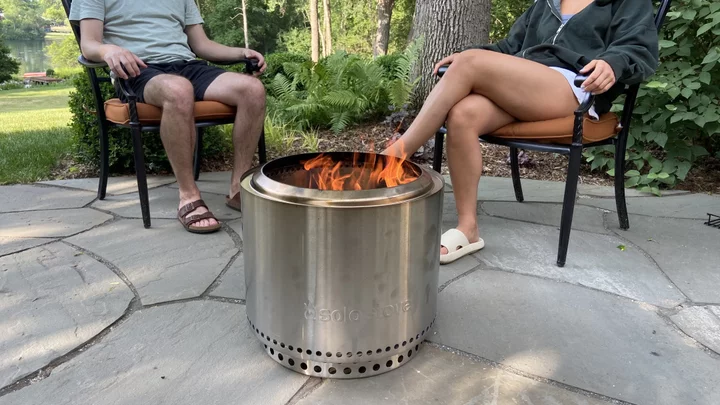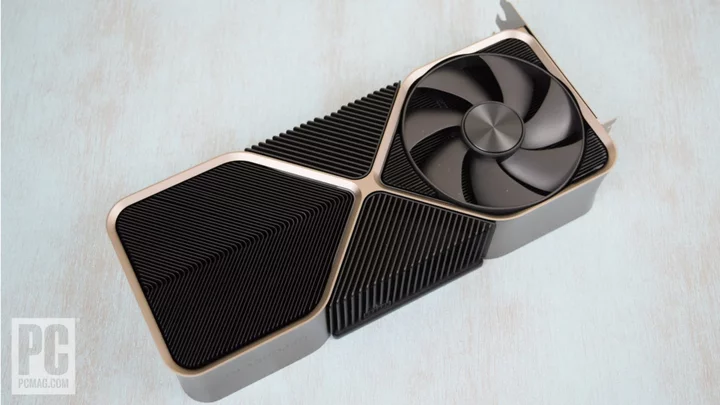Some of my most nostalgic childhood memories were evenings spent around the fire pit in my family's backyard, a humble ring of slate slabs hand-stacked around a shallow hole. When picked clean of leaves and pill bugs and piled high with logs, it would burn a crackling golden blaze that would gild marshmallows, toast our shins, and leave us with piles of smoky laundry at the end of the night.
The Solo Stove Bonfire 2.0 is a portable wood-burning fire pit that promises to resolve this issue with ultra-clean, smokeless flames. It's not the first or only fire pit to make such claims, but a wildly successful Kickstarter campaign, a pandemic bump, compelling social ads, and word of mouth have stoked its popularity.
SEE ALSO: The best fire pits of 2023My family was skeptical about the Solo Stove the first time I brought out the mid-sized Bonfire 2.0 model for testing on a trip to the Northwoods: At face value, it's a pretty unremarkable stainless steel drum. (My dad went off on a tangent about some guy from YouTube who supposedly replicated it with a garbage can — "it worked perfectly!") But while none of us would pay full price for it, we were all won over before its coals had cooled.
How the Solo Stove works
The Solo Stove has a double-walled design with two sets of vent holes: one around the exterior of its base and one encircling its inner rim. There's a perforated base plate where wood sits and a metal ash pan to catch embers inside its main burn chamber, and an angled metal flame ring on its upper rim to protect the fire from wind gusts.
Assembly takes a minute tops. Credit: Haley Henschel / MashableThe removable ash pan and base plate are new additions for the Solo Stove 2.0 models from late 2022; the 1.0 versions needed to be Shop-Vacced or tipped over and dumped out in order to be cleaned between fires.
The removable components make cleanup a breeze. I didn't even need to remove the ash pan after one of my fires (right) — all of the leftovers came out with the base plate. Credit: Haley Henschel / MashableWhen a fire kindles inside a Solo Stove, the heat and lack of oxygen from the initial combustion process produce a vacuum that sucks air up through those exterior vent holes into the burn chamber beneath the ash pan. The air between the pit's metal walls then heats up and rises as the fire gets fed from below, adding more warm oxygen to the flames from above when it leaves the inside vent holes. This "secondary combustion" makes the fire so hot that it burns up its own smoke — in theory.
What makes the Solo Stove so special?
This design is not unique or special to the Solo Stove brand in 2023. Breeo, a Pennsylvania-based purveyor of premium smokeless fire pits, claims to have released its first double-walled prototype back in 2011 — five years before Solo Stove's Kickstarter went up. Brands like Cuisinart and Tiki (as in, the torches) have also hit the market with competition in recent years.
BioLite's FirePit+, which has a manger-shaped mesh design equipped with Bluetooth support, a rechargeable battery, and 51 airjets that pump its fire with oxygen, is the only truly different smokeless fire pit I've come across.
The Solo Stove Bonfire 2.0 is constructed from lightweight 304 stainless steel, which is pretty in person (though it does hold onto fingerprints). Its carrying case is made from durable nylon. Credit: Haley Henschel / MashableHowever, there are a few factors that set the Solo Stove apart from its peers:
Its polished and minimalist look goes with almost any decor.
Its new removable ash tray makes it really easy to clean.
Its lightweight frame is easy for most people to lift and move. (The Bonfire 2.0 I tested comes in at just under 24 pounds and includes a carrying case. For comparison's sake, Breeo's "portable" Y Series Fire Pit weighs 31 pounds — though it is collapsible.)
It works with a good variety of accessories (all sold separately), including a handle, a stand, a pellet adapter, a spark screen/shield, a heat deflector, a protective barrier, a griddle top, and a pizza oven attachment.
I would also add that a good chunk of the Solo Stove's perceived "specialness" can be credited to the fact that the brand is really, really good at social media. Aesthetic videos of people using their Solo Stoves on scenic beaches and cliffs at sunset are foolproof fodder for TikToks and Instagram Reels, and close-up shots of the cool vortex effect produced by a successful secondary burn can stop anyone mid-scroll.
Is the Solo Stove actually smokeless?
The amount of smoke a Solo Stove can eliminate in practice largely depends on how long its fire's been burning and the type of wood you're fueling it with. You're going to see about five to 10 minutes of smoke right off the bat as your kindling gets going, so temper your initial disappointments accordingly.
As soon as you have a decent-sized flame, you can top it up regularly with hardwoods to help the fire burn big and clean; avoid softwoods like pine, which will produce smoke. All pieces of wood should be as bone-dry as possible and cut to size so that they don't protrude from the pit's rim.
With practice and a couple armfuls of brittle oak and maple, I managed to burn fires with close to zero smoke inside of the Solo Stove Bonfire 2.0. (And any traces of smoke that did materialize were funneled straight upward instead of in my face.) I never got a blaze so big that the secondary burn wafted flaming rays around its edges, but the flickering reflections in its metallic interior were beautiful when it got dark outside.
Via GiphyTo quote my sister's fiancé, who oversaw the Bonfire 2.0's first trial in the Northwoods: "You could sit in a full 360 around this thing and no one would be in a bad spot."
Of course, the main downside to having a fire pit designed to get fires so hot that they burn their own smoke away is that it absolutely chews through wood — even the hardwoods I used. It's almost too efficient, so make sure you have an ample supply of logs on hand for every use.
Via GiphyFinally, it's worth mentioning that the minimal smoke produced by a Solo Stove's roaring fire takes most of its heat with it as it drifts straight upwards. If you want to use one to warm up on chilly nights, look into adding its heat deflector.
Final thoughts: Is the Solo Stove worth it?
The Solo Stove is a vast improvement over any traditional fire pit or campfire I, or anyone else in my family, have ever used. ("I think we need to get one of these," one sister whispered to me as we roasted marshmallows over the Bonfire 2.0.) But its price is a huge hangup, especially when you factor in its accessories: "That's why I haven't bought it [yet]," my dad told me.
I have two points of consolation for possible buyers, the first being that Solo Stove's excellent build quality should last you for a long, long time. After several fires and many miles traveled between different yards and patios over the course of the past year, my Bonfire 2.0 hasn't shown any signs of wear or tear aside from developing an expected patina. What's more — and I wouldn't necessarily recommend doing this — the stand that came with my testing unit managed to survive an hours-long burn inside the pit after my parents confused it for an interior component.
The other notable plus is that Solo Stoves are incredibly easy to find on sale year-round for up to hundreds of dollars off — not just on the brand's website, but at retailers like Amazon, too. Keep an eye out for these discounts, and you'll be golden.









